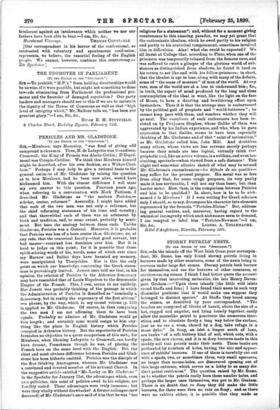PERICLES AND MR. GLADSTONE.
[To THE EDITOR OP THE " SPECTATOR."]
Sin,—Mirabean, says Macaulay, "was fond of giving odd compound nicknames. Thus, M. de Lafayette was Grandison- Cromwell; the King of Prussia was Alaric-Cottin ; D'Espr6- menil was Crispin-Catiline. We think that Mirabean himself might be described, after his own fashion, as a Wilkes-Chat- ham." Perhaps I may help to give a rational basis to the general estimate of Mr. Gladstone by raising the question as to bow Mirabean, had he been now alive, would have nicknamed him. With the utmost diffidence I will state my own answer to this question. Fourteen years ago, when referring to a conversation with Mark Pattison, I dem ibed Mr. Gladstone as " the modern Pericles,— scholar, orator, reformer." Assuredly, I might have added that each of the two men was not only a reformer, but the chief reforming statesman of his time and country; and that therewithal each of them was an aristocrat by birth and tradition, and, to some extent, probably by senti- ment. But here the analogy between them ends. Unlike Gladstone, Pericles was a General. Moreover, it is probable that Pericles was less of a born orator than Gladstone, or, at any rate, that the oratorical faculty—that good servant, but bad master—exercised less dominion over him. But it is hard to judge on this point; for it is possible that those spirit-stirring words of his, words, some of which ever since my Harrow and Balliol days have haunted my memory, were manipulated by Thucydides. Nor is this the only point on which our knowledge concerning the Greek states- man is provokingly limited. Jowett once told me that, in his opinion, the relation of Pericles to the Athenian democracy may have resembled that of Louis Napoleon to the democratic Empire of the French. This, I own, seems to me unlikely. But Jowett was probably thinking of the passage in which the Administration of Pericles is described as "nominally a democracy, but in reality the supremacy of the first citizen," —a phrase, by the way, which in my recent volume (p. 123) is applied to Mr. Gladstone. Of course, in thus comparing the two men I am not affirming them to have been equals. Probably no admirer of Mr. Gladstone would go this length ; and certainly none would assign to him any- thing like the place in English history which Pericles occupied in Athenian history. But the superiority of Pericles furnishes no objection to a queer comparison of this sort ; for Mirabean, when likening Lafayette to Cromwell, can hardly have dreamt, Frenchman though he was, of placing the French hero on the same level with the English. Bnt the chief and most obvious difference between Pericles and Glad- stone has been hitherto omitted. Pericles was the disciple of the free-thinking Anaxagoras, whereas Mr. Gladstone was a convinced and devoted member of his national Church. In the suggestive article entitled "Mr. Lecky on Mr. Gladatone " in the Spectator for January 21st, the advantages which, even as a politician, this saint of politics owed to his religion, are forcibly stated. Those advantages were truly immense; but were they wholly without drawbacks? A former colleague (now deceased) of Mr. Gladstone's once said of him that he was " too
religions for a statesman"; and, without for a moment giving countenance to this amazing paradox, we may yet grant that the enthusiastic idealism, which he owed partly to his religion and partly to his oratorical temperament, sometimes involved him in difficulties. Alas ! what else could be expected P We all learnt at College that, according to Plato, when one of the prisoners was temporarily released from the famous cave, and was suffered to catch a glimpse of the glorious world of sub- stances as distinguished from shadows, he found it bard on his return to act like and with his fellow-prisoners; in short, that the idealist is apt to lose, along with many of the defects, some of " the sense of measure" of men of the world. At any rate, men of the world are at a loss to understand him ; for, in truth, the aspect of mind produced by the long and close contemplation of the ideal is wont, like the light on the face of Moses, to have a dazzling and bewildering effect upon bystanders. Thus it is that the average man is embarrassed by the political gait of prophets and " world-betterers "; he cannot keep pace with them, and wonders whither they will go next. The unsafeness of such enthusiasts has been in- sisted on by Fitzja.mes Stephen, whose dislike of them was aggravated by his Indian experience, and who, when he gave expression to that dislike, seems to have been especially thinking of Mr. Gladstone and of that " saint of rationalism," as Mr. Gladstone called him, John Mill. And doubtless many others, whose views are less extreme merely perhaps because their minds are less logical, virtually think that prophetic zeal, like an active volcano, is a sublime, and even I as- cinating, spectacle—when viewed from a safe distance ! This slight and somewhat allusive sketch of what may be termed Mr. Gladstone's encumbrances—les defauts de ses qualiks- may suffice for the present purpose. His metal was so free from alloy that, for some rough purposes, its very purity made it less serviceable, I will not say than baser, but than harder metal. How, then, is the comparison between Pericles and him to be qualified ? In short, how is he to be nick- named a la Mirabeau? If I were writing for Greek scholars only I should, so to say, decompose his character into elements represented by the formula " Pericles-Nicias." But, address. ing general readers, and, moreover, having regard to the whimsical incongruity which each nicknames seem to demand, I am tempted to label him " Pericles-Newman."—I am,






































 Previous page
Previous page